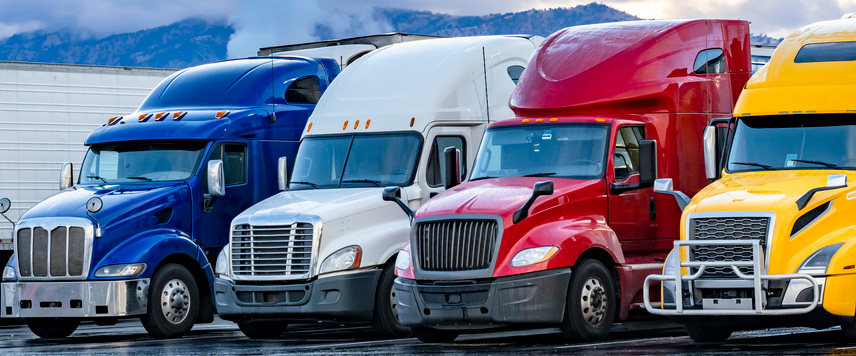Wellness programs can reduce your company's healthcare costs and improve retention and recruitment. Programs that have effectively reached their drivers see lowered healthcare costs, reduced absenteeism, and a lower rate of accidents. While health concerns are not a high-ranking factor in changing from one carrier to another, for those already in the industry, evidence shows that health programs indicate that you are interested in your drivers as people, improving your retention rates.
As the driver shortage grows, it is important that your recruitment looks beyond hiring workers today and starts promoting truck driving as a career to those outside the industry. Health concerns are a factor in deciding if this career is right for those not already in the profession. Thinking back to the stereotypes that surround trucking, health issues are a common factor.
Today we will look at wellness programs, their benefits to carriers, and what you can do to combat the health issue stereotypes.
Types of Wellness Programs
Wellness programs can take all forms: in-person training sessions, webinars, coaching, educational materials, health screenings, apps, and more. Wellness programs can be developed in-house or outsourced to one of the many services designed for the trucking industry.
The key to an effective program is finding a way to reach your drivers. In the Federal Motor Carrier Safety Administration (FMCSA) study, most companies surveyed struggled with reaching the drivers to gain their participation in the program. According to their research, the keys to a successful wellness program are:
- Commitment from the C-Suite that goes beyond monetary and personal support to include participation in programs
- Clear purpose and quantifiable goals
- Perform a needs assessment to better understand what types of programming will be the most impactful for your team
- Develop a realistic budget
- Strong program leadership: clear ownership and effective program management will make or break its success
- Utilizing qualified professionals: subject matter experts provide legitimacy and accuracy to your program
- Effective communication: Develop your program communication with your drivers in mind
- Disseminate accurate and up-to-date research-based information
- Develop your program to be accessible and convenient
- Develop a supportive culture and physical environment
- Develop a scalable program designed to be individualized to meet each employee's needs
- Have a clear and defined evaluation system
According to the FMCSA study, drivers are aware and do take ownership of the need to improve their health. Most of those questioned believed that the health of truck drivers was poor overall. Several key lifestyle factors mentioned by drivers contributed to this, including the lack of time to exercise, lack of showers when exercising on the road, less access to healthy food options, and being unsure of what foods were the best to eat at restaurants.
When asked what types of programming would assist them, drivers pointed to items like:
- gym membership reimbursement
- information about healthy eating options in restaurants
- annual physicals
- exercise facilities at truck stops and terminals
- details on how to exercise in the truck
- changing logbooks to allow time for exercise
- allow spouse ride-along and more.
When asked how best to reach them and get them involved with the company wellness program, they suggested:
- videos
- motivational audio options
- seminars
- family involvement
- buddy system
While employer programs alone cannot reverse truck drivers' healthcare crisis, a multi-tiered holistic program can catalyze change. Building a strong wellness program that reaches your drivers and their families and has quantifiable results can be daunting. Still, the rewards in driver satisfaction, improved safety, and lower health care costs are worth the effort.
ROI of Wellness Programs
In a 2018 survey by Inbound Logistics, 48% of carriers offered wellness programs, while an updated number in 2022 is not noted; in general, 52% of all US companies provide wellness programs, indicating that trucking companies are at least on par with the average of all US companies.
According to Zippia, in 2022, 72% of all employers offering wellness programs saw reduced healthcare costs. Not all wellness programs are successful, but, on average, the cost of the programs is made up in savings produced by the programs. The average ROI is roughly 6 to 1, they report.
According to the research by Dr. Michael Lemke and Dr. Yorghos Apostolopoulos, "The most common cost savings used to evaluate driver health and wellness programs were fewer hospital claims (23.9%), fewer disability issues (19.6%), and keeping healthy people healthy (19.6%)." They also note that most companies surveyed did not believe that their health and wellness programs impact retention and recruitment. However, only 10.9% evaluated their program based on higher driver retention and higher driver satisfaction. Only 15.2% evaluated based on increased productivity.
One of the key factors you should evaluate your wellness program on is increasing job satisfaction. Young Millennials and Gen Z, on the whole, place great value on satisfaction in their workplace. Gone are the days when people worked for a paycheck regardless of the conditions. Today, people want to feel valued, respected and have meaningful work. There is no doubt that trucking provides meaningful work, but, in survey after survey, truckers point to not feeling valued or respected. If your drivers feel you are supporting them in negating this career's negative impacts, you will go a long way to improving relations and retaining and recruiting drivers. As you implement your wellness program, you should track its effects on retention and recruitment. Tracking these items is important to quantify and improve upon this key area of success.
Wellness Programs and Recruitment
As we mentioned, wellness programs are not listed by those currently in the profession as a key factor in choosing one carrier over another. If pay, bonuses, and other benefits are similar, a strong wellness program and accompanying culture can be the deciding factor.
Turnover rates are at 95-100% or more for many carriers; turnover is a disastrous problem. It can cost upwards of $13,932 to hire a driver. While pay is important, throwing even more money, especially sign-on bonuses, at drivers only effectively leads to job hopping.
To win drivers and excite the next generation in this career, it is important that your recruitment materials and your recruiters excite prospects with your company's wellness program and its strong company culture of driver respect. Utilize your wellness program as an indicator of your company's concern for the health and happiness of your drivers.
Video is an important medium in reaching drivers and potential drivers today, especially young Millennials and Gen Z. Offer videos with your drivers that answer health-related questions openly and honestly. Or employee spotlights that showcase your drivers exercising on the road. Showcase healthy individuals in your recruitment materials. Let their peers highlight a healthy lifestyle with company support; a multitude of studies show that our peers are more believable and effective in creating change than management.
Conclusion
Strong multi-tiered wellness can lower healthcare costs and improve driver retention and recruitment. It can increase job satisfaction, reduce the number of accidents, and improve productivity. Any steps that can reduce these costs and improve your drivers' lives are worth the time and effort.
Our next article in this series will look at your recruitment marketing materials and how to best highlight your commitment to your drivers' health.
Are you not meeting your recruitment goals? Join LzRecruit Network! We offer 100% direct leads. Lower your Cost Per Lead and Time to Hire today. For more information on the LzRecruit Network, contact us at 800-755-0623.
_____________________________________________________________________________
Debra_lz
Debra Watkins covers recruitment and digital marketing for Lionzone. A Nashville native, after graduating from the University of Kentucky, Debra utilized her research and writing skills in the museum and heritage tourism fields, rising to director of two institutions, before returning to Nashville in 2020 to join Lionzone.
Resources:
https://www.bls.gov/data/inflation_calculator.htm
https://www.zippia.com/advice/employee-wellness-statistics/
https://www.inboundlogistics.com/articles/driver-wellness-programs-the-right-thing-to-do/
Development of driver wellness program.pdf
https://rosap.ntl.bts.gov › dot › dot_30020_DS1
https://journals.sagepub.com/doi/10.1177/2165079915569740
https://www.inboundlogistics.com/articles/driver-wellness-programs-the-right-thing-to-do/




